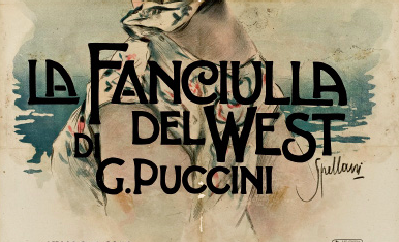“La Fanciulla del West” (The Golden Girl of the West) is an action-packed Italian opera by Giacomo Puccini. It is set in California circa 1850 in the American Wild West and features a strong, smart heroine who uses her wits to outsmart the villain and help the love of her life escape his near-death. The recent revival of “La Fanciulla del West” was streamed live from the Metropolitan Opera on Saturday, Oct. 27 at the Regina A. Quick Center for the Arts and included subtitles translated into English from the original Italian. Minnie, the heroine, was masterfully sung by soprano Eva-Maria Westbroek, Jonas Kaufmann was dashingly charming in the role of Ramirez, the outlaw who falls in love with Minnie and steals her heart, and baritone Željko Lučić was very convincing as the villainous sheriff Jack Rance.
At the start of the performance, conductor Marco Armiliato sprang to the pit in a wild burst of energy. On stage, a group of gold miners and cowboys in large, seemingly dusty, hats and weathered jeans gathered to play poker in a wooden bar.
“Jim, perchè piangi?” was a heartbreaking song where the gold miners, who traveled to California in search of gold and riches, sang about their memories of home and the families that they missed so dearly. This reminded me of today’s immigrants who leave their homes and families behind in hopes that they will do well in this country, often sending some of their earnings back to the family they left behind.
Throughout the show, all of the men in the town are after Minnie, the golden girl who owns the local saloon. Minnie rebuffs them all, including the very persistent town sheriff, Jack Rance, because she says she is “happy being alone.” Giacomo Puccini wrote this opera in 1910, a time when women did not even have the right to vote. This is a powerful and revolutionary statement for a female heroine during Minnie’s time.
Minnie reminded me a lot of Belle from “Beauty and the Beast”: both love to read, yearn for adventure and actively shape the world around them. Minnie’s bedroom in the second act of the opera was shown to have piles of books, even as she lamented her lack of education and wondered what she could have done if she had only had more opportunities. She, like Belle, loves to read and wonders what more is out there besides her “provincial life” in her small town. Both Minnie and Belle also fight against their villainous pursuers: Jack Rance and Gaston, who are both persistently aggressive in their pursuit even after they have been rejected many times.
Rance gets angry at Minnie when she rejects him, and Minnie responds “Are you mad at me, Rance? I only spoke my mind.” Rance wants to track down and kill Ramirez, because he has been a bandit “for far too long.” Minnie did not know that Ramirez was a bandit; she only knew him as the kind, intelligent, man who had always been good to her. But as Ramirez explains to Minnie, he only became a highway bandit because he was poor and had no money, and “without any opportunities.”
With themes that mirror the #MeToo movement and that reference the unequal access to education, this 1910 opera is extremely relevant to today’s audiences.
Ultimately, Minnie is able to trick Rance and save Ramirez from his clutches in a game of high-stakes poker, armed with the battle cry: “What are you, Jack Rance? A gambler. And Johnson? He’s a bandit. And I own a saloon… We’re all alike! Bandits and gamblers!” Minnie, the bold and intelligent heroine and Ramirez, her kind and resourceful counterpart, are characters that will live on long after the curtains have closed and the lights have dimmed on the stage.


Leave a Reply